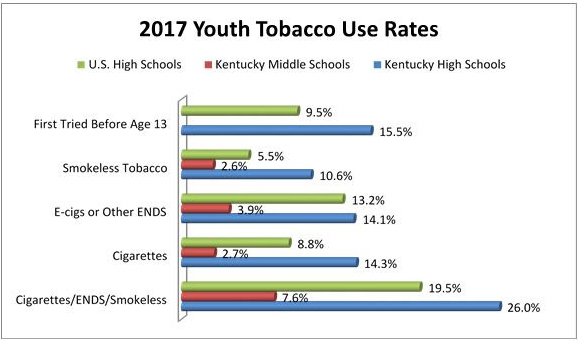Smoke-Free Coalition will lobby for state law to ban tobacco products and e-cigs from all school property and activities

By Melissa Patrick
Kentucky Health News
Concerned that historic declines in youth tobacco use will be undermined by the “exploding popularity” of Juul and other e-cigarettes, Kentucky’s Coalition for a Smoke-Free Tomorrow says it will lobby for a state making all schools in the state 100 percent tobacco-free in the upcoming year.
“We’re suddenly seeing epidemic levels of kids vaping e-cigarettes, and we’ve got to get a handle on it before we totally reverse the gains we’ve made in the last couple of decades in reducing youth tobacco use,” Ben Chandler, chair of the coalition, said in a news release.
The latest Kentucky Health Issues Poll that found 87 percent of Kentucky adults would support such a law, and polls since 2013 have found strong support for the policy, but there has been little legislative progress toward it, and fewer than half of local school boards have acted. School-board seats are on the ballot in all districts this fall.
“It’s a good time to ask school board candidates think about such a policy, and if they would support it or not,” said Al Cross, director of the Institute for Rural Journalism and Community Issues, which publishes Kentucky Health News.
Legislative bills to require all school properties and school events to be tobacco-free have gained little to no traction. Two were introduced in the last session, but were not called up in the legislature’s education committees. The Senate passed one in 2017, but the House didn’t take it up.
The coalition says it will promote a comprehensive policy that “prohibits the use of all tobacco products, including e-cigarettes and vapor products, by staff, students and visitors at all times inside board-owned buildings or vehicles, on school property, and during school-sponsored field trips, sports events and other activities.”
It also wants the law to provide adequate funding for signage and other tools to implement the policy, make penalties for violation appropriate and not prevent students from learning, and allow local bodies to enact stronger policies than the state policy.
Fewer than half of Kentucky’s school districts have enacted such policies. As of July, 72 of the 173 districts had adopted 100 percent tobacco-free school policies, covering 734 schools and 57 percent of the state’s students. Federal law only prohibits smoking inside schools that receive federal funding.
“A statewide tobacco-free schools law would expand a powerful tool already used by 734 schools in the state to all Kentucky public schools, in order to reduce youth exposure and peer pressure to tobacco products and create an atmosphere where tobacco use is not the norm,” the coalition said.
Kentucky’s high school students smoke at a much higher rate than the national average, 14.3 percent compared to 8.8 percent. Almost as many, 14.1 percent, use e-cigarettes, a bit above the 13.2 percent nationally, according to the 2017 Youth Risk Behavior Survey.
The e-cigarette figures are probably higher now, health experts have warned, because Juul sales have surged since the survey — so much that it’s prompted the U.S. Food and Drug Administration to crack down on them and other vaping-product companies over their teen marketing strategies.
Juuls and their cheaper knock-offs are especially popular among teens because they are small and look like an oversize USB drive, making them easy to hide from parents and teachers. They also offer flavors that are appealing to youth, and pack a powerful nicotine punch.